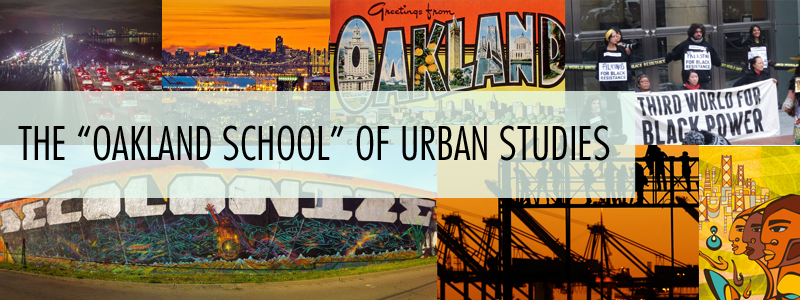Bridging Disciplines
by Allison Logan
October 20th was the second monthly meeting of the Oakland School of Urban Studies. These meetings allow the group to sort through logistics, hash out and envision future group events, discuss long-term goals, and discuss a set of readings that provide a lens with which to interrogate histories and representations of Oakland. This month, readings were assembled by two members of the group around the topics of history, race, and citizenship in Oakland. We read some excerpts from classic academic pieces on Oakland, such as Self’s American Babylon: Race and the Struggle for Postwar Oakland and Rhomberg’s No There There: Race Class and Political Community in Oakland, supplemented by work from Ananya Roy and non-academic pieces from newspapers and blogs. The discussion was robust, ranging from broad questions about racial formation in the past and present and the politics of belonging to more specific questions about the implications of using West Oakland as a site for elaborating Oakland’s history (which many academic pieces do). One interesting conversation that came up centered on who is granted agency in discussions of Oakland, past and present. As graduate students, it was particularly striking to hear an article from The New York Times, “Oakland, the Last Refuge of Radical America” by Jonathan Mahler, describe protesters as graduate students, professors, professionals, and members of the Black Bloc. As if these are the groups of people who inspire change, not the lifelong residents who are stripped of agency. This dominant representation is a reminder to be relentlessly reflexive of our own role in Oakland’s dynamic landscape.
This was the group first meeting that I could attend and the first interdisciplinary group that I have ever been a part of. It was really exciting to be in a space where a bunch of people are invested in complicating their understandings of a single place or set of ideas. Bringing together people with different backgrounds on several levels is something that doesn’t happen often and really has the potential to generate new insights that can transcend some of the constructed and arbitrary boundaries around knowledge. Although the payoff is often huge, this initial experience also reminded me that it takes time and conscious effort to get there. It was great to be pulled out of comfortable, familiar conversations and inserted into one that was new and malleable. Disciplinary isolation is pervasive and naturalized at almost every step in the production of academic work — from brainstorming sessions to the audiences of finished work. In academia, this exists across the social science-humanities divide, though also between the disciplines grouped into these categories. Even if academic work is not the goal (or only goal), we are each embedded to some extent in academic institutions that shape the questions we ask or how we go looking for answers. Part of the process of interdisciplinary collaboration necessitates a vigorous deconstruction and rebuilding of the language we can use to communicate with each other and audiences outside of our group. Conceptual tools, methodological strategies, and aspirations cannot be taken for granted. Or they can, but we will only talk past and not with each other to generate new questions, critiques, and strategies for moving forward. This meeting has helped to set the groundwork for this process, and I am excited to continue the journey with a group of people that I have much to learn from!
